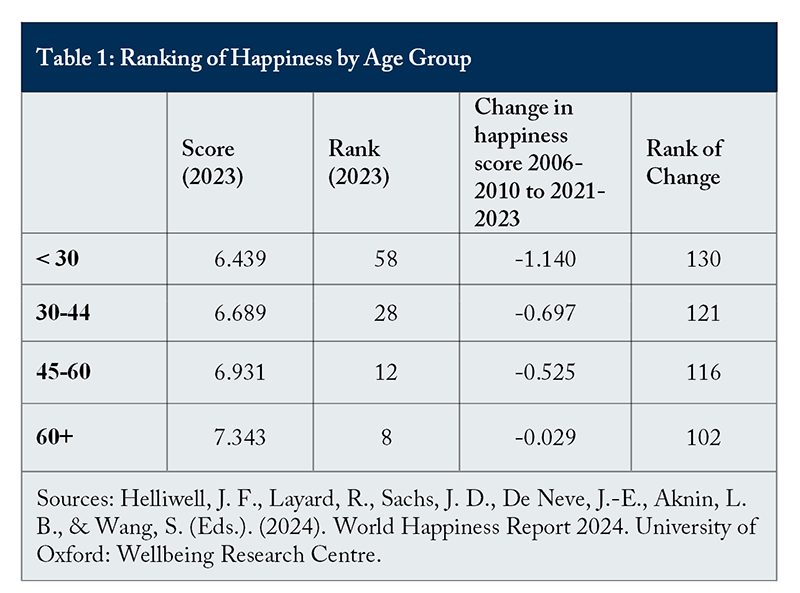Home / Publications / Intelligence Memos / The Kids Are Not All Right and Neither Is Anybody Else
- Intelligence Memos
- |
The Kids Are Not All Right and Neither Is Anybody Else
Summary:
| Citation | Rosalie Wyonch and Bafale, Mawakina. 2025. "The Kids Are Not All Right and Neither Is Anybody Else." Intelligence Memos. Toronto: C.D. Howe Institute. |
| Page Title: | The Kids Are Not All Right and Neither Is Anybody Else – C.D. Howe Institute |
| Article Title: | The Kids Are Not All Right and Neither Is Anybody Else |
| URL: | https://cdhowe.org/publication/the-kids-are-not-all-right-and-neither-is-anybody-else/ |
| Published Date: | February 10, 2025 |
| Accessed Date: | November 6, 2025 |
Outline
Outline
Related Topics
Files
To: Concerned Canadians
From: Rosalie Wyonch and Mawakina Bafale
Date: February 10, 2025
Re: The Kids Are Not All Right and Neither Is Anybody Else
Canada ranks 15th on the world happiness index in 2024. This sounds pretty good until you compare it to 10 years ago when we were fifth. The results are more dismal for young people. For those below the age of 30, Canada ranked 58th out of 134 countries. When broken out into sub-metrics, the only one to improve in the last decade is generosity (from 43rd to 17th.) The relative ranking of GDP per capita, social support, healthy life expectancy at birth, freedom to make choices and perceptions of corruption have all deteriorated since 2015.
The need to reverse this trend is axiomatic: Everyone would be happier.
These feelings also have real economic impacts. Research shows that increasing happiness (by 1 unit on a 10-point scale) led to a 12-percent increase in productivity. When it’s sunnier out, people make more credit card purchases. Happier people have more satisfying work, tend to have more psychologically fulfilling lives, and are more likely to live longer and healthier lives. They also tend to be more creative and productive and stay more socially connected. These benefits, in turn, flow back to families, workplaces, and communities, creating a virtuous well-being cycle. Conversely, negative affect and emotional exhaustion are related to lower productivity and more “presenteeism.”
Employers and policymakers should be concerned. A less happy population is less productive and spends less. When Canada has had six consecutive quarters of declining GDP per capita, we cannot afford to get any sadder.
Overall, Canada’s happiness rankings show the most significant deterioration in the freedom to make choices, where Canada’s rank has fallen from second to 38th since 2015. For social support and GDP per capita, Canada’s ranking fell about 15 places to 20th and 21st, respectively. Healthy life expectancy declined by nine places to 18th, and perceptions of corruption fell by six to 13th. These trends are certainly concerning, and that concern only increases when looking at changes by age group.
Happiness rankings improve with age. For people 60 years of age and older, Canada ranked eighth (Table 1). Older Canadians have had relatively consistent happiness scores since 2006, though there has been a slight decline. It’s a different story for Canadians under 30, whose happiness has fallen further than young people in 130 other nations. The only countries with a worse decline are Jordan, Venezuela, Lebanon and Afghanistan.
This is both shocking and puzzling – those four nations have experienced war, political upheaval, and prolonged high inflation that dwarfs Canada’s recent inflation bout. Meanwhile, US numbers exhibit a similar pattern to Canada, though the magnitude of declining happiness is lower for young people.
Despondent young people are not a good sign for a nation, and policymakers should investigate and address the underlying causes. Those causes might not be entirely rational – economic and political conditions in Canada have not deteriorated nearly as much as they have in Afghanistan. Although financial vulnerability is associated with lower and faster-declining life satisfaction and reduced hope for the future, the decline can’t be entirely explained by new waves of unemployment, housing market affordability, geopolitical unrest or environmental anxiety, all of which have been present for the past two decades.
Increasing proportions of the population feeling hopeless about the future and lacking a sense of connection with their communities is a concerning trend for the future of population health and the economy. It may be time to follow the lead of the United Arab Emirates – it ranks 22nd in the latest report – and create a Ministry of Happiness and Wellbeing. Or the Netherlands (ranked 6th), with intergovernmental community initiatives targeting loneliness. Or the UK (ranked 20th), with a Loneliness Minister. Or the US Surgeon General’s report warning of the epidemic of loneliness and isolation. Other countries are taking action to address declining happiness. Meanwhile, the decline in happiness is worse in Canada, particularly for those under age 30.
Governments, employers and everyone: This is a call to action; let’s find things to get excited about and get everyone involved again! We can’t afford to be pessimistic.

Rosalie Wyonch is Associate Director of Research at C.D. Howe Institute, where Mawakina Bafale is a Research Officer.
To send a comment or leave feedback, click here.
The views expressed here are those of the authors. The C.D. Howe Institute does not take corporate positions on policy matters.
Related Publications
- Opinions & Editorials
- Opinions & Editorials


